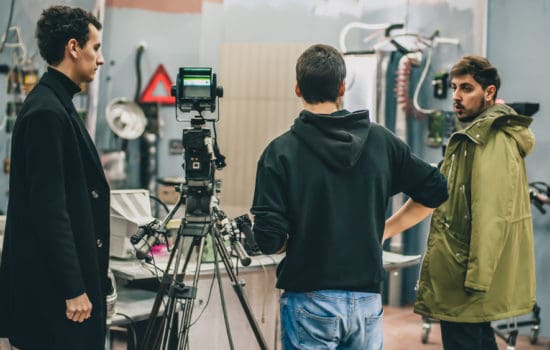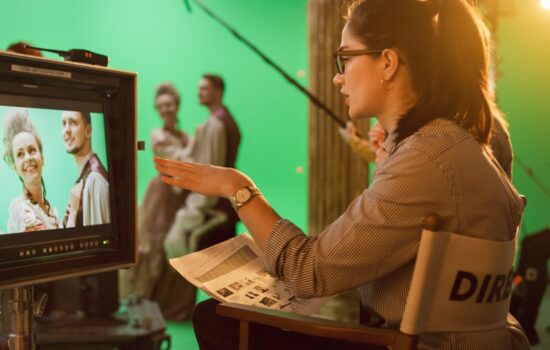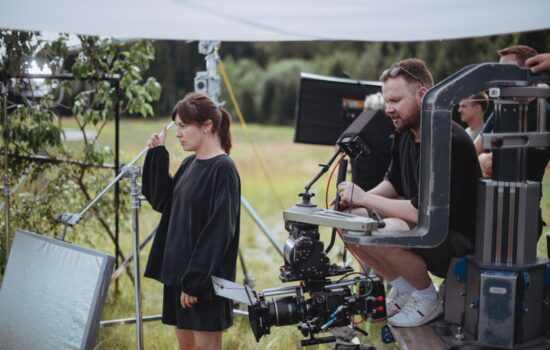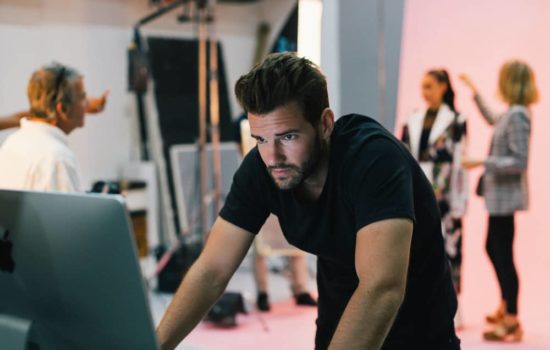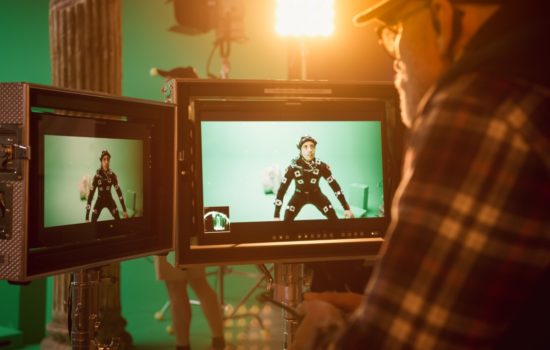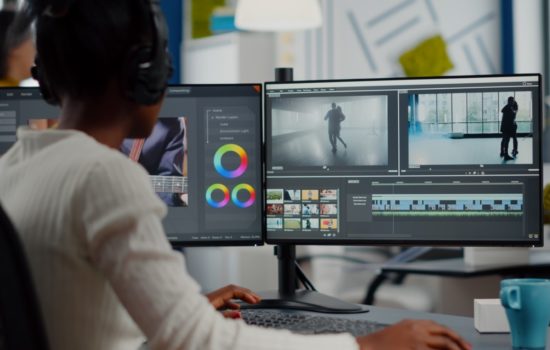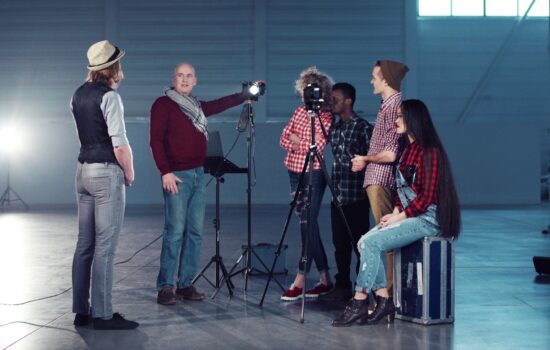Music Supervisor
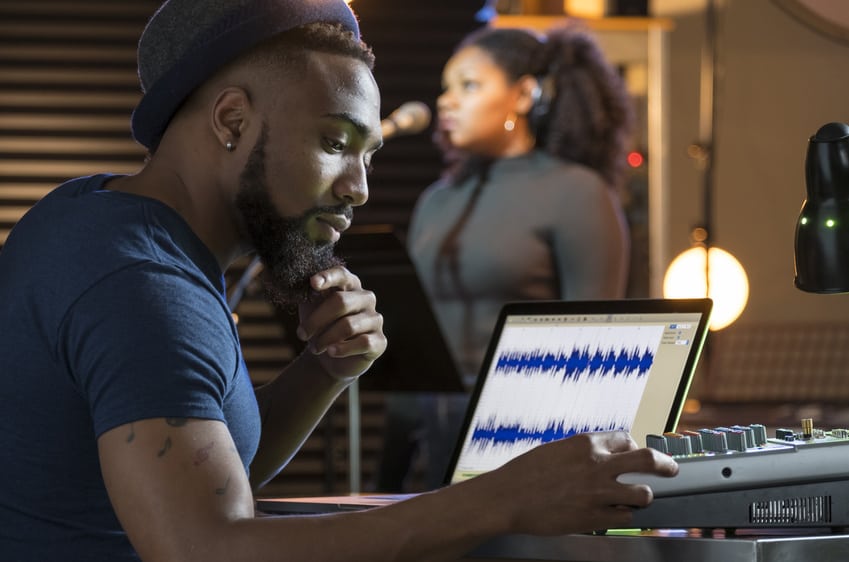
How To Become a Music Supervisor
People also ask
- Do Music Supervisors get paid well?
- How do you start a career as a Music Supervisor?
- What skills do Music Supervisors need?
- How does a music supervisor collaborate with the director and producers to establish the musical vision and tone for a film?
- How does a music supervisor balance creative vision with budget constraints when selecting music for a film?
- How does a music supervisor stay updated on emerging artists, trends, and genres to ensure the music selected for the film remains fresh and relevant?
Career Description
The Music Supervisor is the head of the music department on a movie or TV show. They oversee a range of duties from finding a Composer, securing original music, starting and finalizing deals with Music Publishers and record labels, booking studio time, dealing with the Musicians Union, and consulting with the film’s Director on creative music decisions.
Mike Turner, a veteran Music Supervisor who has worked on many notable Hollywood productions states, “After the film’s Composer has been hired, the Music Supervisor works parallel with them. You coordinate with the Director on what will be original music and what sections of the film are going to use licensed songs and sometimes those things change as the project evolves.
“The Composer and Music Supervisor deal directly with the film’s Director. The songs we license come from record labels, Publishers and music pitching companies so we’re coordinating with them to find the right material. Usually, there is some overlap between what a score or song moment could be. It’s not competitive. Everyone’s trying to determine what will be the best for the film.”
The Music Supervisor oversees all music on a movie, but after the Composer has been hired, then they mostly focus specifically on music licensing and other music issues that would fall outside of what’s on the Composer’s plate.
How do you start a career as a Music Supervisor?
Beyond more obvious needs such as having a strong work ethic and organizational skills, successful Music Supervisors must also have a proficiency for networking with others and acclimating to sometimes intense work hours. Having the ability to hustle for that next gig will also be a defining trait that will help a Music Supervisor not only start their careers but also maintain their longevity over the course of it.
Salary
The average annual salary for Music Supervisors is approximately $54,100. The salary range for Music Supervisors runs from $44,000 to $65,000.
The real challenge, when it comes to pay for Music Supervisors, is that there is no union. It’s the wild west when it comes to fees. When getting started in music supervision, just go do it, make friends with filmmakers, and hustle for free. Create connections and get credits on IMDB.
Turner advises, “People will recognize that and hopefully hire you for bigger productions. Rates tend to be based on the budget of the film but there’s very little that’s “standard” until you start doing bigger productions. I try not to do films with budgets under $1 million.
“My rate for the $1 to $6 million range is $15,000 to $20,000, and over $10 million is $40,000 and up. Big studios may pay $80,000 to $90,000 for services on a $100M+ film. Then, of course, there are soundtrack album points that can be negotiated for but soundtrack income is pretty rare these days.”
It’s good to remember that a film can be made for $250,000 but that doesn’t make the rights to songs less expensive so be careful what you commit yourself to do and try to sign up for things you can actually achieve. Also, most Music Supervisors will have several projects going at a time.
Do Music Supervisors get paid well?
In a word, yes. However, the salary of a Music Supervisor is dependent upon multiple factors such as their professional experience and the budget of the films they work on. The salary range for Music Supervisors can fluctuate greatly from just under $16,000 in a given year to more than $400,000 in the same timeframe.
Hey, what do you think about trying our new Film Career HelperFilm Career Helper really quick? It’s totally free and could help get your career moving fast! Give it a try. It’s totally free and you have nothing to lose.
Career Outlook
Music Supervisors basically don’t have weekday versus weekend schedules. When working on independent productions, people work when they want to work. This puts the Music Supervisor on-call all the time. There’s usually a fair amount of putting out fires, even on a Sunday night.
Turner says, “Most of the time I work from home, with a little recording studio rig at my disposal for editing or whatever else I may need to do. I think at the very least, a Music Supervisor needs to be able to edit so that they’re not dependent on the Music Editor but a surprising amount of Music Supervisors actually don’t have that skill. Otherwise, I’m on a mix stage or on set.
“If musicians are performing a song on camera, then it’s important that the audio department has the proper recording for playback that they can mime to and that they have the right lyrics. Or if the players are AFM sideliners that you’re on top of the union and budget issues that go along with that.
“If you only have thirty seconds of a song cleared due to budget, then rehearsals are probably needed to make sure the scene can work with that slice of the song and you don’t need to re-clear for more time or something like that.”
This freelance position is in constant collaboration, whether it’s with production or a Music Publisher, record label, artist, Manager, Agent, etc. So, their life is constantly reliant on other people’s deadlines and schedules. This can be great if a person likes variety in their life.
A Music Supervisor’s main boss is the Producer and/or Showrunner on a TV show and a Director when working on a film. Otherwise, it’s the advertising agency when it’s time to make a commercial.
How does a music supervisor collaborate with the director and producers to establish the musical vision and tone for a film?
Collaboration is a key component of the job for music supervisors. They need to understand the creative vision of the film before they can properly do their job. Here’s how this works…
- Creative Meetings
- Creative Brief
- Spotting Sessions
- Research
- Licensing and Clearance
- Music Integration
The music supervisor needs to start a film by meeting with the director and producers so as to clearly identify and understand the creative intent of the filmmakers. From here, discussion can begin of how much will be used to support the storytelling, while also encompassing the emotions, narrative, and themes of the film.
The music supervisor then prepares a creative brief off the initial session with the director and producers. This outlines their previously-discussed creative intent and musical direction for the film. The creative brief may include genres, styles, motifs, and even specific songs or scores as reference to complete the vision for the project’s direction.
Once there’s filmed material to assess and work with, the music supervisor meets with the director and editor for spotting sessions, where they identify key scenes and moments that could benefit from using music. They’ll often discuss the desired emotional impact of the scene and how best to use any suggested music.
With the knowledge of which scenes will have music, the music supervisor dives into deep music research, looking for songs, bands, composers, and musicians whose work may align best with what they’re looking to accomplish. They’ll typically present options to the director and producers for consideration, seeking feedback and input to refine the choices.
After music selections have been finalized, the music supervisor negotiates licensing agreements and obtains clearances for the use of each piece of music in the film. This is done by ensuring all legal requirements are met and obtaining permission from music’s copyright holders.
Once all the music has been cleared, legally and financially, the music supervisor works with director, editor, and sound team to integrate it into the film. They oversee the timing of transitions, cue placement, and overall balance between music, visuals, and other audio elements.
Career Path
Changes in the music industry have greatly impacted licensing songs in films. There are more opportunities than ever because there’s more media than ever (but also a lot less money for everything).
Turner says, “Advancement in the film industry for Music Supervisors is something I think about often. The career has changed dramatically in the last fifteen years. It’s not what it was when I decided that it’s what I wanted to do. The biggest issue is the advent of the digital music marketplace and streaming [services] like iTunes and Spotify, which really hurt the soundtrack album industry and greatly affected the economics of music supervision.
“A lot of ways Music Supervisors made money in the past was through soundtrack albums which they had points on. They don’t make anywhere near the same amount of money now.”
“When a record label releases a compilation album of pre-existing songs (like a soundtrack) and puts it on Itunes, those songs exist in the same space as every other compilation those songs appear on and often the consumer doesn’t even have to buy the entire soundtrack album as you would have to in physical form.”
“So if a consumer sees a film and likes the songs and then goes to iTunes to find those songs they don’t care which record label or compilation they are buying them from, they just want the songs they like . . . so it becomes a Russian Roulette for the labels that spent the money to put those songs out when someone can just click and purchase song by song from any record right in the same 5 square inches of screen space.”
“With streaming services like Spotify, it’s even worse because as of yet, there is actually no way to direct streaming royalties for specific masters back to anyone besides the original copyright owner of that recording. So third party labels can’t monetize compilations. Furthermore, literally anyone can make a playlist on Spotify and if the film is popular then the fans will have multiple playlists posted before the studio can get one together anyway.”
“This is why most official soundtrack albums you see now are mostly original score albums and not “song” albums unless it’s a big studio movie and they can afford the loss while treating the soundtrack as a marketing expense to help build awareness for the film. In the ‘90s, a soundtrack would regularly go gold and platinum, not so much anymore.”
“I’ve done thirty-five movies and only three of them even put out soundtracks. Haven’t seen a dollar from any of them. Additionally, there is no robust middle class of filmmaking anymore. There used to be a lot of films with budgets of $10 to $30 million that paid $20,000 to $60,000 dollar music supervision fees and then, of course, the soundtrack points on records that actually sold. You can make a decent living on that.”
He goes on to state, “Now there are basically four major studios that make a few $100M (and up) movies per year and then a vast sea of indie projects, some of which are being made for under $100k and can’t even afford music. To be in the regular mix for getting those big studio films you need to become one of about twenty or so people who all that work goes to or fight for scraps with everything else.”
“I tend to do films budgeted in the one to ten million range and I’ve been lucky to get that work because there is such a lack of films in that budget range. But it’s still a good idea to do tiny films that don’t pay much if you really think they’re great.”
“You never know what independent production the next Academy Award-winning best picture will be. Moonlight for example, was made for under $2M, from what I’ve heard. Television is kind of the new creative frontier for Music Supervisors these days.”
There’s more TV than ever, it’s better than ever, and there’s no such thing as “indie TV” so it tends to pay better and more reliably. There are still opportunities to become a Music Supervisor; however, it requires a ton of networking and taking a lot of risks on independent films in the beginning. Hopefully, it all leads somewhere good.
An apprenticeship is one way to break into the industry. Get an internship with a big Music Supervisor and work your way up to becoming an Assistant, then Coordinator, and finally a Music Supervisor. Usually, the leap from Coordinator to Music Supervisor is difficult and can take some time.
Companies are run by a main Music Supervisor who gets enough work that they can’t do it all themselves [and they] will hire people to help them facilitate working on multiple projects. At the end of the day, it’s the veteran Music Supervisor whose name is on it, even if other people did most of the work finding the songs.
They’ll help if someone is with them a long time; then maybe a promotion will happen. In this case, a new individual rarely ever gets to become the head honcho, though.
Turner advises, “If someone really wants to become a head Music Supervisor, they need to start their own company but they’ll be competing with established veterans. However, as soon as someone is hired to be a Music Supervisor, now they are one — there’s no union or set of criteria to meet in order to get that credential.
“You just have to get hired. So, it pays to befriend Directors and Producers.” It can be good to work at a music supervision company but most big-name Music Supervisors are independent, with maybe one or two Coordinators.
- Music supervise independent films, including shorts.
- Get an internship with a music supervision company.
- Work with a Music Publisher or record label.
- Take a Music Supervisor to coffee; the conversation will help get the lay of the land.
How does a music supervisor balance creative vision with budget constraints when selecting music for a film?
This is a common issue among music supervisors (and productions in general), and sometimes getting the music they really want isn’t always feasible within their budgetary confinements. There are a number of strategies to try and deal with this situation…
- Communication
- Alternatives
- Negotiating
- Optimizing Resources
- Budget Tracking
As always, it’s imperative that the music supervisor and director and producers are all on the same page as far as the movie’s creative intent. With a fixed budget in mind, the team can get a better sense of what can and can’t be accomplished in terms of goals for the finished film.
In case first (or even second) music choices don’t come through, it’s a good idea for music supervisors to have several options (of varying costs) in mind for scenes and moments in the film. Sometimes lesser-known, less-expensive songs can not only solve the issue, but end up working out even better from a creative standpoint. Sourcing music from royalty-free libraries and emerging talent is also an option to keep in mind.
Music supervisors need to be strategic here and dig into their network. Often they’ll need to leverage their relationships with record labels, music publishers, and artists to negotiate lower fees and/or more favorable terms.
Music is often reused in a film, and sometimes its repeated use can drive thematic and/or emotional points home. This is a great way for a music supervisor to strategically repurpose cues that have already been purchased and reposition them at different points in the film.
The music supervisor should keep a constant eye on their budget, ensuring that they’re not stepping out of range. Here, they’ll want to prioritize spending based on the importance of each musical cue and make sure that resources are distributed effectively to achieve the desired creative impact.
Experience & Skills
Most people place a lot of emphasis on taste. Turner explains, “They assume if you love music and music history then you’ll make a good Music Supervisor. It doesn’t. The fact is everyone has taste and it is subjective. Having good taste doesn’t help make using a song legal or keeping a production from getting sued.
“That’s where the vast majority of copyright infringement disputes come from — the music department. So, it’s the Music Supervisor’s job to keep the Director and Producer from getting in trouble with that stuff, like not realizing there are ten Publishers on a song (and then not clearing all the rights) or thinking something is public domain when it’s not.”
Therefore, it’s important that a Music Supervisor knows all the rules. It’s great to be creative but the Director and Producer are going to have their own opinions and the Music Supervisor’s opinion will always be second to theirs.
A Music Supervisor needs to be detail-oriented because there are a lot of moving parts. Turner says, “Landmines are everywhere. One example is that publishing has percentage splits and if working multiple contracts with a most favored nations clause (meaning everyone gets paid the same), it’s easy for one person to ask for something they think is small — but that ripple causes a massive wave.
“In my job, I’m really focused. It’s the only aspect of my life that is organized. Everything’s channeled there.”
A person doesn’t necessarily need to be hyper-organized in their everyday life, but when it comes to the career of a Music Supervisor, they need to pay attention to every moving part in order to be successful; there are a lot of spreadsheets involved.
What skills do Music Supervisors need?
Music Supervisors must have a rounded out set of skills to be successful at their jobs. While having a strong sense of what works well musically for a film or other project is critical for this role, they must also be able to communicate clearly and respectfully with a host of others in the industry, such as the Director, Composer, and other relevant professionals.
Education & Training
There are a lot of paths to becoming a Music Supervisor. Most people who are really doing it didn’t come to it in any hierarchical system. Some people study in a music business program. Others learn from a publishing and supervision course.
Turner adds, “There are some doing that. I don’t know any Music Sups personally that have gone through it that way. I grew up ski racing and went to college for English literature and decided about halfway through that I was more interested in the music business. So, I finished my English degree and then went back to school for a technical degree in audio engineering elsewhere after that.
“After I was done with school I played in bands for a long time and did live sound and worked in recording studios. I didn’t know what intellectual property (IP) was. I got into music publishing in 2005 when I got hired by Bug Music Publishing (now part of BMG) to rep their catalog for advertising in Chicago.
“When I discovered the whole IP side of the music business it was a total revelation for me. It looked like this was the last area for real profit in the music industry and I felt dumb for basically never having heard of it. At that time, the recorded music business was in free fall.
“Nobody was selling records, but brands and movie studios were paying hundreds of thousands for sync rights for a song and suddenly using indie music in stuff was getting super popular.”
The most important thing for an individual is to assess what program or approach makes sense to them and pursue it. Taking a specialized course isn’t always a necessity; some people learn better by just jumping in with both feet.
Additional Resources
“There is a Music Supervisors Guild now, which is a pretty good resource. It’s the first step to unionization. It’s an organization that attempts to illuminate and refine the Music Supervisor’s role to the rest of the entertainment industry and lobby for recognition on their behalf,” states Turner.
There are also Facebook groups that Music Supervisors will create to help each other but usually, people need to be approved to join them. However, once they are, these groups can be a very valuable resource.
If a Music Supervisor needs a Publisher’s contact info, they can ask and someone will usually provide information like an email address. Music Supervisors are generally nice people and willing to help a colleague out because they know that sometime down the line, a favor might be needed.
How does a music supervisor stay updated on emerging artists, trends, and genres to ensure the music selected for the film remains fresh and relevant?
If there’s an industry that’s constantly growing, changing, and evolving at a ridiculously fast pace, it’s the music industry. And music supervisors need to stay on top of the ever-shifting landscape. Here are a few strategies for keeping updated…
- Streaming Platforms and Playlists
- Music Showcases and Festivals
- Publications and Websites
- Networking
Platforms like Apple Music, Spotify, and SoundCloud are invaluable tools for discovering new talent and getting a window into curated playlists. These playlists are often put together by influencers and music industry professionals who tend to be at the front lines of new musical discoveries.
Music festivals, industry events, and showcases are a terrific way for music supervisors to stay informed on, and in some cases even discover, new talent. Festivals provide in-person, firsthand exposure that’s invaluable when it comes to meeting people and forging new connections.
Music industry websites, blogs, and publications tend to cover emerging trends, genres, and artists. They usually provide interviews, reviews, and pieces on new talent that can be informative and helpful for a music supervisor looking to discover new talent.
As is true in every industry, networking with peers and industry colleagues for a music supervisor is the ideal way to stay informed about the latest trends, happenings, and talent in the music industry. Networking events, industry forums, and workshops can all be invaluable resources in keeping in “the know” of the music business.
FAQ
What is the single biggest suggestion you would give to someone wanting to get into this career?
“Start working at a music publishing company, even an independent one. Learn about music copyrights. It’s important to focus on what IP is, rather than a physical product. Recordings are one-dimensional items while the intellectual property of a song has many applications and can be exploited in multiple ways.
“Publishers can be a lot more dynamic than record labels just because of the nature of the copyrights they work with. It’s a place to learn a lot more about the backbone of music industry work.
“It’s complicated to become an effective Music Supervisor and it might be easier to get an internship at a music publishing company than a music supervision company. Most Music Supervisors work alone unless they’re huge and even then there are only a handful of music supervision companies. Get a foot in the door and work on independent productions where the stakes aren’t as high before starting your own company.”
What’s the #1 mistake people make when trying to get into this career?
“There are so many ways to get a production screwed. Lots of legal traps are everywhere, especially when involving public domain. There’s a lot of misinformation about what public domain means and is.
“Don’t believe anything on the internet. Very little music is public domain. Unless it’s a classical piece from the 1700s, don’t assume its public domain. It’s a lesson you’ll learn hard as soon as it happens to you. So beware of legal traps in contracts and especially those involving public domain.”
What is the question people should ask about this career but rarely do?
“What’s the business side of music supervising like?
“Music supervising is very contract oriented and transactional. The biggest thing that can affect a Music Supervisor that Directors and Producers often don’t understand is that you must back your creative into your budget and not the other way around. It is counterproductive to spend a bunch of time just imagining cool songs that might work for a scene and without understanding the rights situation on them. It becomes a large game of whack-a-mole to do it that way.
“The best thing to do is understand the budget and do a conservative music breakdown on the script (meaning always overestimate music costs). Then go to your label and Publisher contacts and say, ‘Here’s how much money I have and here’s the type of music I’m looking for.”
“Having them pitch to you means there’s less haggling and you’ll understand the clearance issues so that you can advise the production properly. From there, the Directors and Producers can evaluate and decide.”
What is one thing I should have asked which I didn’t?
“Any other lessons?
“Don’t pitch what you can’t clear. A Music Supervisor needs to get a pre-clear (whenever possible) and figure out what a song will cost. Never put anything in front of a Director unless it’s been verbally cleared.
“Record labels and Publishers will actively pitch the Music Supervisor. They pitch songs based on your budget and songs that WANT to be placed. Those licensing conversations are much easier to have than when you come begging for a favor, which you will have to do plenty of anyway.
If you could describe in one word what makes you successful, what would it be?
“Suppressing rage. Everyone assumes that they are an expert. The business of music supervision is separate from music knowledge.”
Sources

Mike Turner
Mike Turner is an award-winning Music Supervisor, Music Editor and Music Producer for film, television, and advertising. Turner grew up in Seattle and began working in recording studios and playing in bands as a teenager.
His professional trajectory has led him to major cities all over America, working in numerous music/creative capacities for music publishers, record labels, licensing companies, radio stations, TV networks, and ad agencies.
As a Music Supervisor, Turner found his niche in Los Angeles and today works on most projects independently. His services have been engaged for films by Judd Apatow, Michael De Luca, Seth Rogen, Ice T., Charlie Sheen, Bret Easton Ellis, Paul Schrader, and Nick Cassavetes, as well as commercial spots with Converse, Booking.com, Petco, Estee Lauder, Rise Credit, Microsoft, Acer Computers, and Volvo.
In the world of television, Turner has music supervised series for CBS, Netflix, MTV Networks, Direct TV, Hulu, Fox Sports, and VICELAND/A&E. Recent credits include the TV show No Activity and the films Mapplethorpe and Under the Silver Lake.
Turner is also a regular guest speaker/panelist at national and international music industry conferences. He has served as a Speaker and/or Panelist at Canadian Music Week, ASCAP Expo, Music Biz Summit, and Guild of Music Supervisors conference. Turner has been profiled by Music Row, SAG Indie, and Southern California Public Radio’s Take Two program.
References
- 1. "Music Supervisor Salaries in United States". Glassdoor.com. published: December 15, 2019. retrieved on: May 31, 2016
